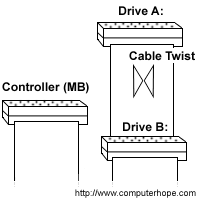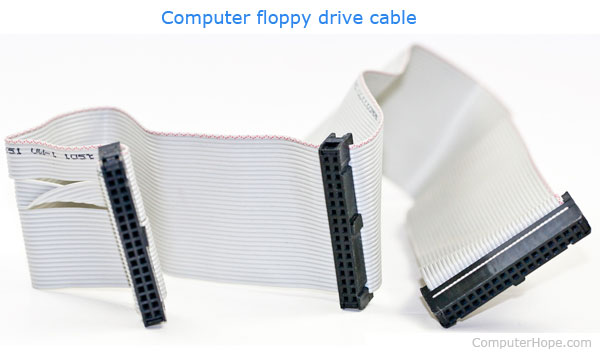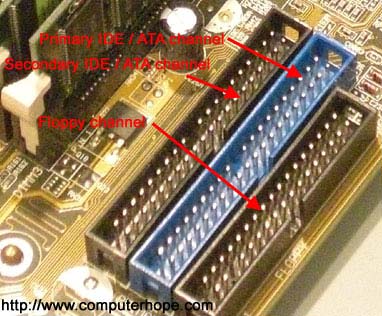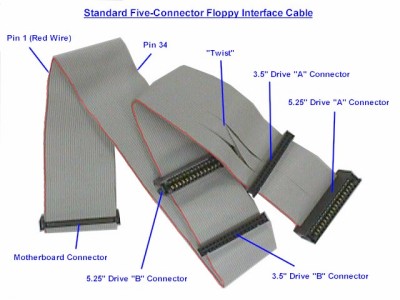Floppy cable что это
Что такое флоппи-диск, зачем он нужен и почему больше не актуален?
Давайте перенесемся немного в прошлое и поностальгируем. «Школоте» не понять, а поколения «постарше» еще помнят, что в компьютерах когда-то был привод для специальных «гибких дисков».
Floppy disk (флоппи- диск) — это первое устройство для хранения информации. Это сейчас кругом «флешки» на сотни гигабайт информации, а до них были оптические CD-диски, а до CD-дисков были «фло п ики».
Сам по себе слот имел специальный «моторчик», который «сцеплялся» с центром дискеты и «раскручивал» гибкий диск до 300-360 оборотов в минуту. В момент раскрутки в работу подключалась магнитная головка (а иногда даже 2, чтобы обрабатывать обе стороны гибкого диска) и помогала взаимодействовать с «фло п иком».
На сегодняшний день «фло п ика» можно встретить во многих приложениях только в качестве иконки к кнопке «Сохранить».
Floppy disc зародились еще в 1967 и просуществовали до 10-х годов нашего тысячелетия, хотя фактически от них стали отказываться еще в конце 90-х. В процессе своей «жизни» «фло п ики» были разных размеров и конфигураций.
Приведем несколько интересных характеристик и свойств:
третье поколение «фло п иков» имел о 3.5 дюймов, именно эти дискеты оказались самыми популярными и дожили до времен своего исчезновения, они были самыми «объемными» среди своих предшественников: 720 Кб, 1.44 Мб и максимальный 2.88 Мб.
Итак, в период с 2010 и до 2013 года все производители «фло п иков» отказались от их производства и приводов к ним. При этом использовались «фло п ики» вплоть до 2018 года, именно в том году американский Пентагон перешел на новые технологии и отказался от применения 8-ми дюймовых дискет.
Достоинства и недостатки floppy disk
Как и у многих устройств, у «фло п иков» есть свои достоинства и недостатки.
К достоинствам можно отнести следующие :
простая технология и алгоритм записи;
доступные и универсальные, как современные «флешки»;
для того времени это был оптимальный объем переносимой информации;
К недостаткам можно отнести следующие :
даже для того времени иногда не хватало объема для переноса программного обеспечения или изображений;
очень шумная работа дисковода;
невысокая скорость записи;
низкая надежность: повреждение приводило к тому, что он не читался ; было опасно «размагничивание», при котором терялась записанная информация;
небольшой срок эксплуатации.
Заключение
Уже в 2016-м году этот же инженер создал новую версию своего музыкального устройства, при этом он использовал уже 64 дисковода для «флопиков».
Мы будем очень благодарны
если под понравившемся материалом Вы нажмёте одну из кнопок социальных сетей и поделитесь с друзьями.
Floppy
The original floppy cable required that each drive was jumpered to the right ID. But IBM come up with an idea to avoid jumpering the floppies.
If wire 10-16 are twisted before the last connector the jumpering is avoided. Each drive should be jumpered to act as Drive 2. If only one drive is used then leave the middle connector free.
The IDC could also be an edge connector on some old drives.



34 PIN IDC FEMALE to the Controller.
34 PIN IDC FEMALE to the Drive 2.
34 PIN IDC FEMALE to the Drive 1.
| Controller | Drive 1 | Drive 2 | |
|---|---|---|---|
| Wire 1-9 | 1-9 | 1-9 | 1-9 |
| Wire 10 | 10 | 16 | 10 |
| Wire 11 | 11 | 15 | 11 |
| Wire 12 | 12 | 14 | 12 |
| Wire 13 | 13 | 13 | 13 |
| Wire 14 | 14 | 12 | 14 |
| Wire 15 | 15 | 11 | 15 |
| Wire 16 | 16 | 10 | 16 |
| Wire 17-34 | 17-34 | 17-34 | 17-34 |
| Contributor: | Joakim Цgren |
| Source: | TheRef TechTalk |
Информация предоставлена справочником The Hardware Book Team 1996-2004.
floppy disk interface cable
Смотреть что такое «floppy disk interface cable» в других словарях:
Disk enclosure — A 3.5 USB/FireWire hard disk enclosure A disk enclosure is essentially a specialized chassis designed to hold and power disk drives while providing a mechanism to allow them to communicate to one or more separate computers. Drive enclosures… … Wikipedia
Hard disk drive — Hard drive redirects here. For other uses, see Hard drive (disambiguation). Hard disk drive Mechanical interior of a modern hard disk drive Date invented 24 December 1954 [1] … Wikipedia
Hard Disk — Speichermedium Allgemeines Name Hard Disk Drive Abkürzung HDD Typ magnetisch Ursprung … Deutsch Wikipedia
Hard Disk Drive — Speichermedium Allgemeines Name Hard Disk Drive Abkürzung HDD Typ magnetisch Ursprung … Deutsch Wikipedia
Network interface controller — Network Interface Card (NIC) A 1990s Ethernet network interface controller card which connects to the motherboard via the now obsolete ISA bus. This combination card features both a (now obsolete) bayonet cap BNC connector (left) for use in… … Wikipedia
TRS-80 — For the Chicago based electronica group, see TRS 80 (group). TRS 80 Model I with Expansion Interface Release date August 3, 1977 (1977 08 03) … Wikipedia
Dick Smith Super-80 Computer — Super 80 kit computer The Dick Smith Super 80 was a Zilog Z80 based kit computer developed as a joint venture between Electronics Australia magazine and Dick Smith Electronics. It was presented as a series of construction articles in Electronics… … Wikipedia
Datamax UV-1 — Datamax UV 1R, with the associated analog breakout box on top The Datamax UV 1 was a pioneering computer designed by a group of computer graphics artists working at the University of Illinois at Chicago, known as the Circle Graphics Habitat. It… … Wikipedia
Parallel ATA — ATA connector on the right, with two motherboard ATA sockets on the left. Type … Wikipedia
Commodore 64 peripherals — Commodore 64 Home Computer This article is about the various external peripherals of the Commodore 64 home computer. Contents 1 Storage … Wikipedia
Floppy cable
A floppy cable is a ribbon cable found in PC’s that allow one or more floppy disk drives to connect to a computer. In the illustration, is a visual example of what a floppy cable may look like and where each end of connectors connect. As shown, this cable allows a desktop computer to have two floppy drives connected to one floppy controller.
Because floppy drives don’t have a primary or secondary jumper, the drives are defined by cable select, which is identified by looking for the cable twist. Like an IDE cable, most floppy cables also have a red strip along one side of the ribbon cable to indicate pin 1. Today, if any floppy drive is in the computer it would connects to «Drive A:» and the end cable connected to the motherboard.
The floppy channel, FDD header, or floppy connection is where the floppy drive connects to the computer motherboard. In the picture below, is an example of a motherboard with two IDE connections and a floppy channel connector.
Finally, the standard PC floppy drive connector contains 34-pin holes. Below is a listing of each of these pins and their descriptions.
Floppy Drive Connector
The floppy disk interface uses what is likely the strangest cable of all those in PCs today. It is similar to the standard IDE cable in that it is usually a flat, gray ribbon cable. It is unusual in terms of the number of connectors it has and how it is used to configure the setup of the floppy disks in the system.
The floppy cable has 34 wires. There are normally five connectors on the floppy interface cable, although sometimes there are only three. These are grouped into three «sets»; a single connector plus two pairs of two each (for a standard, five-connector cable) or three single connectors. This how the connectors are used:
 | Controller Connector: The single connector on one end of the cable is meant to connect to the floppy disk controller, either on a controller card or the motherboard. |
 | Drive A Connectors: The pair of connectors (or single connector in the case of a three-connector cable) at the opposite end of the cable is intended for the A: floppy drive. This is explained in more detail below. |
 | Drive B Connectors: The pair of connectors (or single connector in the case of a three-connector cable) in the middle of the cable is intended for the B: floppy drive. |
The reason that the standard cable uses pairs of connectors for the drives is for compatibility with different types of drives. 3.5″ drives generally use a pin header connector, while 5.25″ drives use a card edge connector. Therefore, each position, A and B, has two connectors so that the correct one is available for whatever type of floppy drive being used. Only one of the two connectors in the pair should be used (they’re too close together to use both in most cases anyway). The more common pin header (IDC) connector is shown below.
The three-connector cables are found either in very old systems or in ones where the manufacturer was trying to save a few pennies. They reduce the flexibility of the setup; fortunately these cables can be replaced directly by the five-connector type if necessary.
You will also notice that there is an odd «twist» in the floppy cable, located between the two pairs of connectors intended for the floppy drives. Despite the fact that this appears to be a «hack» (well, it really is a hack), this is in fact the correct construction of a standard floppy interface cable. There are some cables that do not have the twist, and it is these that are actually non-standard! What the twist does it to change the connection of the drive on the far end of the twist so that it is different than the drive before the twist. This is done to cause the drive at the end of the cable to appear as A: to the system and the one in the middle to be as B:.
Here’s how it works in detail. Traditionally, floppy drives used a drive select (DS) jumper to configure the drive as either A: or B: in the system. Then, special signals were used on the floppy interface to tell the two drives in the system which one the controller was trying to talk to at any given time. The wires that are cross-connected via the twist are signals 10 to 16 (seven wires). Of these, 11, 13, and 15 are grounds and carry no signal, so there are really four signals that are inverted by the twist. The four signals that are inverted are exactly the ones that control drive selection on the interface. Here is what happens when the twisted cable is used:







